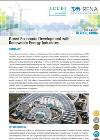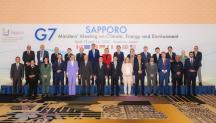

Renewable Energy Policy in Cities: Selected Case Studies
IRENA, in collaboration with the International Council for Local Environmental Initiatives (ICLEI), has produced a series of case studies on cities where local governments have successfully adopted measures to promote renewable energy and sustainability.
Newsletter
IRENA, in collaboration with the International Council for Local Environmental Initiatives (ICLEI), has produced a series of case studies on cities where local governments have successfully adopted measures to promote renewable energy and sustainability:
- Dezhou, China which has actively supported the establishment of renewable energy industries with the Dezhou Economic Development Zone for solar technology
- Chemnitz, Germany where the local government enabled the formulation of strategies to use renewable sources and in 2008 developed the Integrated Climate Protection Programme (Integriertes Klimaschutzprogramm).
- Belo Horizonte, Brazil which has reduced greenhouse gas (GHG) emission substantially and, since 2007, turning a closed landfill site into a waste-to-energy facility.
- Austin, US where the GreenChoice Program active since 2001 has stimulated the initial demand for renewable-based electricity, facilitating municipal and community procurement of renewable energy.
- Sydney, Australia, and Nagpur, India where energy efficiency and renewable energy have reduced emissions from public street lights.
- Sao Paolo, Brazil where a local regulation requires new residential, commercial and industrial buildings to install solar water heating systems (SWH) to cover at least 40% of the energy used for heating water.
- Malmo, Sweden which set targets significantly more ambitious than either the European Union target for Sweden (49% by 2020) or the national plan (50% by 2020), so that the city is expected to be climate neutral with municipal operations run on 100% renewable energy by 2030.




